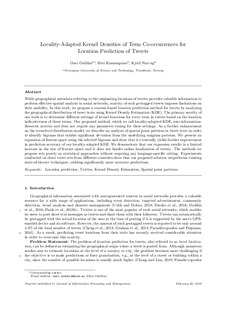| dc.contributor.author | Özdikis, Özer | |
| dc.contributor.author | Ramampiaro, Heri | |
| dc.contributor.author | Nørvåg, Kjetil | |
| dc.date.accessioned | 2019-11-04T08:44:12Z | |
| dc.date.available | 2019-11-04T08:44:12Z | |
| dc.date.created | 2019-06-06T13:44:36Z | |
| dc.date.issued | 2019 | |
| dc.identifier.citation | Information Processing & Management. 2019, 56 (4), 1280-1299. | nb_NO |
| dc.identifier.issn | 0306-4573 | |
| dc.identifier.uri | http://hdl.handle.net/11250/2626278 | |
| dc.description.abstract | While geographical metadata referring to the originating locations of tweets provides valuable information to perform effective spatial analysis in social networks, scarcity of such geotagged tweets imposes limitations on their usability. In this work, we propose a content-based location prediction method for tweets by analyzing the geographical distribution of tweet texts using Kernel Density Estimation (KDE). The primary novelty of our work is to determine different settings of kernel functions for every term in tweets based on the location indicativeness of these terms. Our proposed method, which we call locality-adapted KDE, uses information-theoretic metrics and does not require any parameter tuning for these settings. As a further enhancement on the term-level distribution model, we describe an analysis of spatial point patterns in tweet texts in order to identify bigrams that exhibit significant deviation from the underlying unigram patterns. We present an expansion of feature space using the selected bigrams and show that it eventually yields further improvement in prediction accuracy of our locality-adapted KDE. We demonstrate that our expansion results in a limited increase in the size of feature space and it does not hinder online localization of tweets. The methods we propose rely purely on statistical approaches without requiring any language-specific setting. Experiments conducted on three tweet sets from different countries show that our proposed solution outperforms existing state-of-the-art techniques, yielding significantly more accurate predictions. | nb_NO |
| dc.language.iso | eng | nb_NO |
| dc.publisher | Elsevier | nb_NO |
| dc.rights | Attribution-NonCommercial-NoDerivatives 4.0 Internasjonal | * |
| dc.rights.uri | http://creativecommons.org/licenses/by-nc-nd/4.0/deed.no | * |
| dc.title | Locality-adapted kernel densities of term co-occurrences for location prediction of tweets | nb_NO |
| dc.type | Journal article | nb_NO |
| dc.type | Peer reviewed | nb_NO |
| dc.description.version | acceptedVersion | nb_NO |
| dc.source.pagenumber | 1280-1299 | nb_NO |
| dc.source.volume | 56 | nb_NO |
| dc.source.journal | Information Processing & Management | nb_NO |
| dc.source.issue | 4 | nb_NO |
| dc.identifier.doi | 10.1016/j.ipm.2019.02.013 | |
| dc.identifier.cristin | 1703185 | |
| dc.description.localcode | © 2019. This is the authors’ accepted and refereed manuscript to the article. Locked until 22.3.2021 due to copyright restrictions. This manuscript version is made available under the CC-BY-NC-ND 4.0 license http://creativecommons.org/licenses/by-nc-nd/4.0/ | nb_NO |
| cristin.unitcode | 194,63,10,0 | |
| cristin.unitname | Institutt for datateknologi og informatikk | |
| cristin.ispublished | true | |
| cristin.fulltext | postprint | |
| cristin.qualitycode | 2 | |

